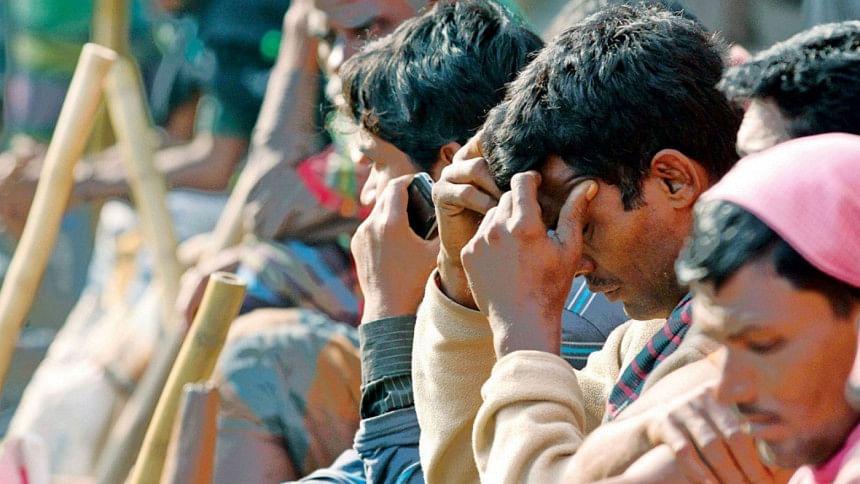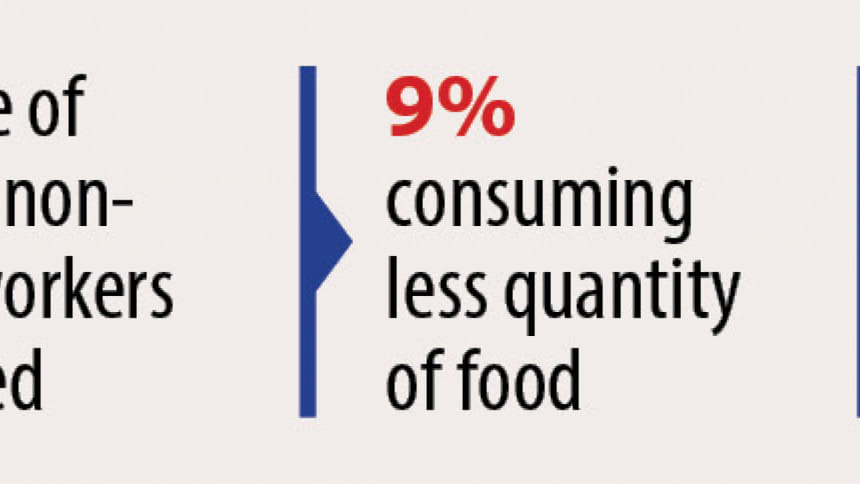Urban Poor in Pandemic: Plunging into debt just to get by


People from the low-income groups in urban areas are struggling to have three meals a day, consume quality food and maintain their daily protein intake due to the crisis induced by the Covid-19 pandemic.
Many of them have plunged into debts after borrowing overwhelmingly from informal sources to face the crisis, Brac University's Centre for Peace and Justice (CPJ) has found in a study.
The report of the study, titled "Covid-19 -- Livelihood Crisis, Social Cohesion Challenges and Mitigation Options: An Empirical Study", was launched at a virtual event yesterday.
A team of researchers applied a mixed-method research -- quantitative research complemented by qualitative tools -- for the study. A survey among 1,056 respondents belonging to three groups -- 425 RMG workers, 425 non-RMG workers and 206 migrant returnees -- was conducted in November and December last year for the study.
The research team also conducted qualitative research through key informant interviews, focus group discussions and others. It reached the respondents in areas under the jurisdictions of the two city corporations in the capital and in Savar. The respondents also included migrant returnees living in Dhaka's Nawabganj upazila, and Manikganj and Madaripur districts.
The study report said 49 percent of the RMG workers said their pay and perks were slashed due to the pandemic.
Their monthly income went down by 21 percent on average compared to the pre-pandemic period. However, their monthly expenditure decreased by only two percent. This forced them to reach for their savings and rely on borrowing and other forms of debts to manage the expenditure.
The study found that 38 percent RMG workers had to reduce the frequencies of their meals, 69 percent had to consume low quality food while 85 percent had to cut their protein intake.
The income of 92 percent of the non-RMG workers declined. Their monthly average income decreased by one-third.
Forty-seven percent of them reported a decrease in the frequency of meals, 73 percent reported that they consumed low quantity food, and 83 percent said they lowered their protein consumption.
The study also found that about 64 percent migrant returnees were repatriated forcefully, while 33 percent of them returned home after their employers bore the relevant costs.
About 84 percent of the returnees did not receive any severance pay or other dues from their employers. Upon arrival, the returnees found it difficult to find jobs here in Bangladesh, said the report.
They have experienced a sharp fall in their average monthly income -- by 60 percent. As a result, the returnees used their savings and borrowed cash to finance expenditure.
A press release from the Brac University's CPJ said while presenting findings of the study, lead researcher Sanaul Mostafa and Shahidul Islam suggested that the informal workers and migrant returnees were the worst sufferers.
People from the low-income groups accumulated debt, borrowed overwhelmingly from informal sources, given the fact that these groups lost, on average, one-third of their income compared to the pre-pandemic period, it said.
Seventy percent of the pandemic-affected workers expected that the government would help them recover from their losses.
The study recommended that the government may develop and introduce a one-year "Solidarity Package" targeted to the recovery and well-being needs of the most-affected groups. Household aides, daily labourers and transport workers may be considered as the preferred target groups.
Given the massive impacts of the pandemic on low-income people's food intake behaviour, the government may introduce targeted programmes to provide them with subsidised nutritional support by expanding the number of fair price outlets managed by the Trading Corporation of Bangladesh (TCB).
Resident Representative of the United Nations Development Programme (UNDP) Sudipto Mukerjee said development agencies, state, private sectors and academic institutions, among others, can work together to find appropriate solutions amidst the pandemic.
Addressing the programme yesterday, Hossain Zillur Rahman, chairperson of Brac and chairman of Power and Participation Research Centre, stressed that a credible research was one of the ways to inform policymakers of the voice of vulnerable groups, including the "new poor" which has emerged during the pandemic.
"The study and the discussions today certainly points to the myriad of ways in which we can continue exploring to develop our understanding of the gaps in policies," he said.
Country Director of ActionAid Farah Kabir, Senior Programme Specialist of James P Grant School of Public Health, Brac University, Yameen Mazumder, Senior Research Fellow of Bangladesh Institute of Development Studies Nazneen Ahmed and Head of Strategy and Planning of Bidyanondo Foundation Manjoor Morshed, were the panelists of event. Executive Director of Centre for Peace and Justice, Brac University Manzoor Hasan, moderated the virtual event.

 For all latest news, follow The Daily Star's Google News channel.
For all latest news, follow The Daily Star's Google News channel. 



Comments